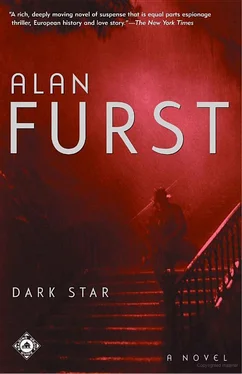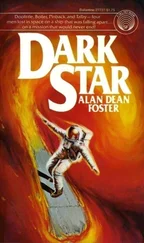Alan Furst - Dark Star
Здесь есть возможность читать онлайн «Alan Furst - Dark Star» весь текст электронной книги совершенно бесплатно (целиком полную версию без сокращений). В некоторых случаях можно слушать аудио, скачать через торрент в формате fb2 и присутствует краткое содержание. Жанр: Шпионский детектив, на английском языке. Описание произведения, (предисловие) а так же отзывы посетителей доступны на портале библиотеки ЛибКат.
- Название:Dark Star
- Автор:
- Жанр:
- Год:неизвестен
- ISBN:нет данных
- Рейтинг книги:3 / 5. Голосов: 1
-
Избранное:Добавить в избранное
- Отзывы:
-
Ваша оценка:
- 60
- 1
- 2
- 3
- 4
- 5
Dark Star: краткое содержание, описание и аннотация
Предлагаем к чтению аннотацию, описание, краткое содержание или предисловие (зависит от того, что написал сам автор книги «Dark Star»). Если вы не нашли необходимую информацию о книге — напишите в комментариях, мы постараемся отыскать её.
Dark Star — читать онлайн бесплатно полную книгу (весь текст) целиком
Ниже представлен текст книги, разбитый по страницам. Система сохранения места последней прочитанной страницы, позволяет с удобством читать онлайн бесплатно книгу «Dark Star», без необходимости каждый раз заново искать на чём Вы остановились. Поставьте закладку, и сможете в любой момент перейти на страницу, на которой закончили чтение.
Интервал:
Закладка:
She opened her bag, put the keys inside, and took out a white cotton handkerchief scented with cologne. Holding it over her nose and mouth, she pulled a corner of the sheet free and looked underneath. Szara could see curly blond hair and part of a ribbon.
The woman dropped the sheet and rubbed her hand against the side of her raincoat. Then she put the handkerchief away and began to go through Khelidze’s pants pockets, tossing the contents onto the end of the bed: coins, rumpled notes of various currencies, a squeezed-out tube of medication, the soft cloth he’d used to polish his glasses, and a Dutch passport.
Next she searched the coat and jacket, hung carefully in a battered armoire, finding a pencil and a small address book that she added to the pile. She took the pencil and poked through the items on the bed, sighed with irritation, and searched in her bag until she found a razor blade with tape along both edges. She peeled off one of the tapes and went to work on the jacket and the coat, slicing open the seams and splitting the pads in the shoulders. This yielded a Soviet passport, which she put in her bag. Taking hold of the cuffs, she removed the trousers and methodically took them apart. When she let out the second cuff, a folded square of paper was revealed. She opened it, then handed it to Szara.
“What is it, please?”
“The printing is Czech. A form of some kind.”
“Yes?”
He studied the paper for a moment. “I think it is a baggage receipt, from a shipping company. No, for the railway station. In Prague.”
She looked the room over carefully, then walked to the tiny, yellowed sink in the corner and began to wash her hands. “You will collect the parcel,” she said, drying herself with her handkerchief. “It is for you.”
They left the room together; she did not bother to lock the door. In the lobby she turned to him and said, “Of course you’ll be leaving Ostend immediately.”
He nodded that he would.
“Your work is appreciated,” she said.
He followed her out of the hotel and watched her get into the Simca. He crossed the narrow street and turned to look back. Heshel was watching him through the window of the car and smiled thinly as their eyes met. Here is the world, said the smile, and here we are in it.
Arriving in Antwerp at dusk, and adding two hours to local time for Moscow, he called his editor at home. From Nezhenko, who handled foreign assignments, he expected no trouble. This would not normally be the case, given a three-week lapse in communication, but when he was asked to do “favors” for the apparat, someone stopped by the Pravda office for a cup of tea. “That Andre Aronovich, what fine work he does! He must take endless time and pains in writing his dispatches. Your patience is admirable.” Enough said. And just as well, for Viktor Nezhenko smoked sixty cigarettes every day and had a savage temper; he could, if he chose, make life miserable for his staff.
Szara booked his call from a hotel room, it went through an hour later. Nezhenko’s wife answered the phone, her voice bright and shrill with feigned insouciance.
When Nezhenko came to the phone, he offered no patronymic and no greeting, just, “Where have you been?”
“I’m in Antwerp.”
“Where?”
Szara repeated himself. Something had gone wrong-Nezhenko had not been “advised” of his assignment.
“So good of you to call,” Nezhenko said.
Szara hunted desperately for water to put out the fire. “I’m doing a piece on dockworkers up here.”
“Yes? That will be interesting.”
“I’ll wire it tomorrow.”
“Send it by mail if you like. Third class.”
“Did Pavel Mikhailovich cover for me? “
“Pavel Mikhailovich isn’t here anymore.”
Szara was stunned. He isn’t here anymore was code. When heard from friends, family, landladies, it meant that the person had been taken away. And Pavel Mikhailovich was-had been-a decent little man without enemies. But none of Szara’s reactions, to ask questions, to show even the most civilized grief, was permissible on a telephone line.
“And people have been asking for you,” Nezhenko added. This too was code, it meant the apparat was looking for him.
Szara felt as though he’d walked into a wall. Why were they looking for him? They knew very well where he was and what he was doing-the world’s plainest man had not been a mirage, and Renate Braun and her helper were realer yet. “It’s all a misunderstanding,” he said after a moment. “The right hand doesn’t tell the left hand …”
“No doubt,” Nezhenko said. Szara could hear him lighting a cigarette.
“I want to go down to Prague after I finish the piece on the dockworkers. There’s the reaction to the Anti-Comintern Pact, views on the Sudetenland, all sorts of things. What do you think? “
“What do I think? “
“Yes.”
“Do as you like, Andre Aronovich. You must please yourself in all things.”
“I’ll file on the dockworkers tomorrow,” Szara said. Nezhenko hung up.
Writing the story of the Belgian dockworkers was like eating sand.
Once upon a time he’d persuaded himself that technical facility was its own reward: a sentence singing hymns to the attainment of coal production norms in the Donets Basin was, nonetheless, a sentence, and could be well rendered. It was the writer’s responsibility in a progressive society to inform and uplift the toiling masses- word had, in fact, reached him that the number one toiler himself had an eye for his byline-so when some demon within wanted to write dark fables of an absurd universe, he knew enough to keep that imp well bottled up. To stay alive, Szara had taught himself discretion before the apparat had a chance to do the job for him. And if, by chance, an intransigent pen stubbornly produced commissar wolves guarding flocks of worker sheep or Parisian girls in silk underwear, well, then the great characteristic of paper was the ease with which it burned.
And these were, had to be, private fires. The world didn’t want to know about your soul, it took you for who you said you were. The workers in the dark little hiring hall by the Antwerp docks were impressed that anybody cared enough to come around and ask them how they felt. “Stalin is our great hope,” one of them said, and Szara sent his voice around the world.
He sat in yet one more hotel room as the Atlantic fog came curling up the streets and wrote these men into the brutal drama being played out in Europe. He caught the strength in their rounded shoulders and brawlers’ hands, the way they quietly took care of one another, the granite decency of them. But for the wives and children who depended on them they would fight in Spain-some of the younger ones in fact were there-would fight in the worker suburbs of Berlin, would yet, families or not, fight from behind the cranes and sheds of their own docks. It was true, and Szara found a way to make it true on the page.
Stalin was their great hope. And if Khelidze mocked this with the yawn on his yellow-stained face, that was Szara’s private problem. And if the “small favor” was now a large favor, that, too, was Szara’s private problem. And if all that made it hard to write, made writing the story like eating sand, who really could he blame? He could always say no and take the consequences. The Russian proverb had it just right: You said you were a mushroom, now jump into the basket.
And people have been asking for you.
Nezhenko’s phrase rode the cadence of the train over the rails from Antwerp all the way to Paris. Much for the best, he calculated, to rush into their arms and find out what they wanted. He hadn’t the courage to stand coolly apart from it all, whatever it was, so he did the next best thing. Checked in with the large Pravda bureau in Paris and asked the secretary to book him on the Paris-Prague express for the following day. He looked into her eyes, saw ball bearings, swore he could hear her lift the phone before the door was properly latched.
Читать дальшеИнтервал:
Закладка:
Похожие книги на «Dark Star»
Представляем Вашему вниманию похожие книги на «Dark Star» списком для выбора. Мы отобрали схожую по названию и смыслу литературу в надежде предоставить читателям больше вариантов отыскать новые, интересные, ещё непрочитанные произведения.
Обсуждение, отзывы о книге «Dark Star» и просто собственные мнения читателей. Оставьте ваши комментарии, напишите, что Вы думаете о произведении, его смысле или главных героях. Укажите что конкретно понравилось, а что нет, и почему Вы так считаете.












